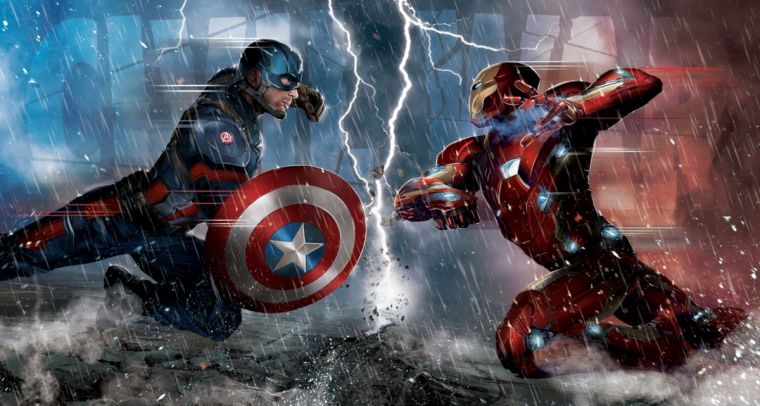Captain America: Civil War review – Good vs Evil isn't always straightforward

Pick a side. In an age of confrontational, binary debates around everything from serious politics to the actions of celebrities, those three words have become a common part of our everyday lives.
The next President of the USA; how we should respond to child refugees; whether or not Britain should leave the EU; emotive questions spark passionate, campaigning answers on both sides, and turn our daily social media feed into a sort of angry supercharged version of Speakers' Corner.
Those three words are also the basis of the plot, and indeed the viewing experience, of this week's megalithic new Marvel Movie. Much like last month's unremarkable Batman vs Superman, Captain America: Civil War pits two iconic superheroes against one another, and invites us to decide which one of them is in the right. The answer is far from straightforward, of course, and so the plot itself sees both men – Chris Evans' titular Captain and Robert Downey Jnr's Iron Man – forming teams of sympathetic heroes to join and amplify their battle against one another. It's basically the film version of the game every nine-year-old child plays with their superhero toys.
Given that it's the 13th film in the comic book giant Marvel's 'Cinematic Universe' (MCU), and features more heroic characters than any of its predecessors, you might be forgiven for wondering if Civil War might just be too ambitious to work. Last year's Avengers: Age of Ultron was on reflection, a bit of an overcomplicated, overblown mess, and many feared it had set a precedent for the series by trying to weave together dozens of complex subplots in a way that ended up more confusing than satisfying. By contrast though, Civil War is remarkably linear, still drawing in the various heroes, but doing so this time in a way that serves a single clear plot thread. As a result, it ends up being one of the very best films in the franchise so far. It's pacy, action-packed, and consistently witty in a way that Batman vs Superman crucially failed to be; it contains moments of jaw-dropping excitement which reward all fans, and especially those familiar with the comics.
Perhaps most importantly, it's actually about something. Unlike some other action and superhero films, which really seem to be concerned with the theme of monsters, robots and heroes hitting each other, Civil War explores real, relatable questions (against the backdrop of heroes hitting each other).
It's a film about friendships, and what happens when they're put under extreme stress. It's largely concerned with the subject of revenge, and exposes both the emptiness of that pursuit, and the difficulty of forgiveness. The Civil War of the title is on one level a political argument, but when boiled down, it's really about the Captain's friendship with a character who appears to have deeply wronged some of the others. Some want reconciliation, others want revenge; just like real-life friendship groups, the film sees the Avengers working out their beliefs and values through the way they process conflict between themselves. And while none of us can really relate to chasing our friend at high speed through a tunnel full of moving cars while he's also being pursued by a man dressed as a panther, most of us have had the experience of sticking up for a friend, or having someone support us when others think we're in the wrong.
The argument at the heart of the film is a pretty good metaphor for the modern church. At one point, a villainous character explains that the easiest way to stop the Avengers is to make them turn on each other, and arguably that's also the best way to stall and hold up the church too. While we aspire to Jesus' John 17:21 vision of Christian unity, in reality we're often characterised by a fractured and fragmented series of in-fights and mission-stalling arguments. And just like Captain America, we can often blindly lend our support to divisive movements and leaders not because they're necessarily right, but because we have an emotional attachment to or history with them. Of course, Jesus doesn't say 'pick a side.' Instead, he says: "Greater love has no man than this: that he lay down his life for his friends (John 15:13)", but just like the Good Captain, we can misinterpret the call to submission and sacrifice as a call to war.
Those intriguing and deeply human themes are what make Civil War ultimately satisfying, but of course, it's the extraordinary action sequences, and the brilliantly drawn characters who enact them, which make it a constant, adrenaline-pumping joy. At two and a half hours it barely drags for a second, because even the long and drawn out battle scenes are constantly innovative. It's no exaggeration to say that the airport scene at the very heart of the movie (and its much-viewed trailer) is up there with the very best action sequences in blockbuster history.
The heroes themselves are well-drawn and well acted, and never seem to be competing with each other for screen time. The two leads are excellent, but the starry supporting cast barely put a foot wrong either. Anthony Mackie's Falcon and Chadwick Boseman's Black Panther are two standout characters, while the fanboy-pleasing introduction of Tom Holland as Spiderman is both fabulously entertaining and sets up the mouthwatering potential of a very different version of that character when Spiderman: Homecoming arrives as the 16th film in the MCU next Summer.
Civil War is, pleasingly, a superb addition to the series, and certainly the best of the films that have tried to marry together multiple heroes. It's both a crowd-pleasing action epic AND a real story about real human (and theological) issues; with so many superstars and heroes on screen at the time, that's no mean feat.
Martin Saunders is a Contributing Editor for Christian Today and the Deputy CEO of Youthscape. You can follow him on Twitter: @martinsaunders











